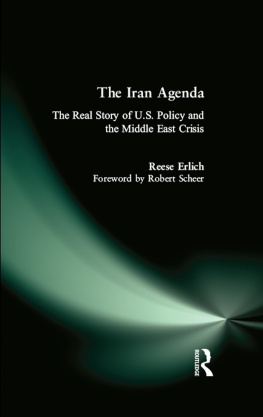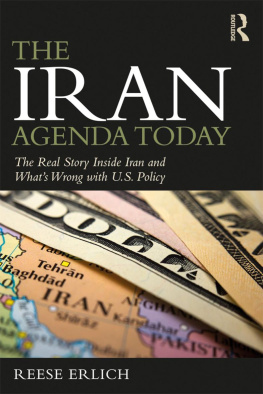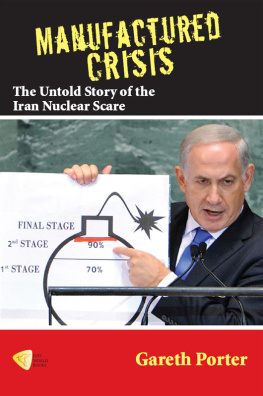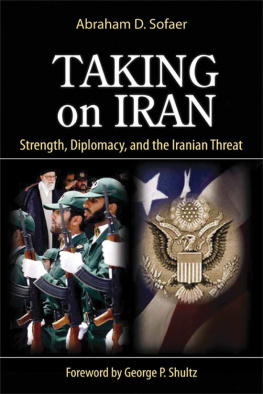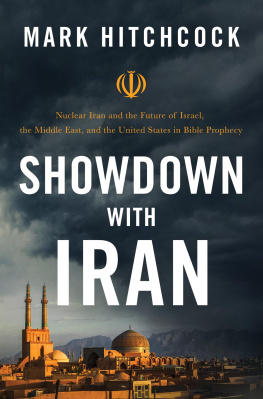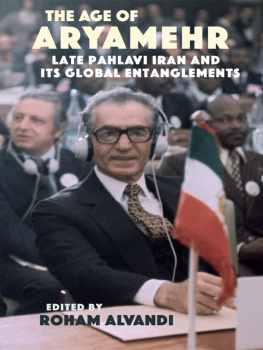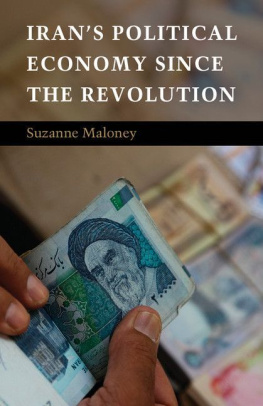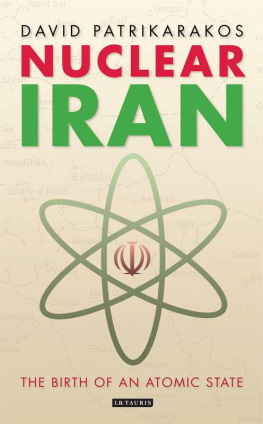
Praise for The Iran Agenda
The Iran Agenda is vital reading for anyone concerned about U.S. foreign policy.
Walter Cronkite
The Iran Agenda takes readers on a whirlwind journey through the conflicts between Washington and Tehran that threaten to explode into disastrous conflagrations. No one trying to understand whats really going on between the United States and Iran could find a better guide than Reese Erlich.
Norman Solomon, author of War Made Easy and Made Love, Got War
Reese Erlich is both a shrewd analyst of how the mainstream media misleads us and an old-fashioned shoe leather reporter who has repeatedly explored firsthand some of the most combustible corners of the world. Its a rare combination, and makes him a valuable guide to the country now in the gunsights of Washingtons hawks.
Adam Hochschild, author of Bury the Chains and King Leopolds Ghost
The Iran Agenda exposes phony U.S. claims about the Iranian threat while conveying the disastrous potential consequences of a U.S. attack. And its wry observations and solid reportingabout the history of U.S. foreign policy, Irans politics, and the oppression of womenmake it a fascinating read.
Medea Benjamin, co-founder of Global Exchange and CODEPINK: Women for Peace
This is a must-read! While the war drums are beating about Iran, Reese Erlich explains how the U.S. is exaggerating the Iranian threat and actually setting back efforts for democratic change in that country. Since peace in the Middle East affects all of us, this gripping and insightful book should be required reading for all Americans.
Peter Coyote, actor and author of Sleeping Where I Fall
THE
IRAN
AGENDA
The Real Story of U.S. Policy and the Middle East Crisis
REESE ERLICH
Foreword by Robert Scheer

The Iran Agenda: The Real Story of U.S. Policy and the Middle East Crisis
First published 2007 by Paradigm
Publishers Published 2016 by Routledge
2 Park Square, Milton Park, Abingdon, Oxon OX14 4RN
711 Third Avenue, New York, NY 10017, USA
Routledge is an imprint of the Taylor & Francis Group, an informa business
Copyright 2007 by Reese Erlich
All rights reserved. No part of this book may be reprinted or reproduced or utilised in any form or by any electronic, mechanical, or other means, now known or hereafter invented, including photocopying and recording, or in any information storage or retrieval system, without permission in writing from the publishers.
Notice:
Product or corporate names may be trademarks or registered trademarks, and are used only for identification and explanation without intent to infringe.
ISBN 13: 978-0-9778253-5-6 (pbk)
This book is dedicated to the people of Iran and the United States, both of whom want peace.
Contents
Historical mischief has stark consequences, not at all mitigated when world leaders, including Americans, claim the best of intentions. Steeped in the mythology of innocence since our own revolt against British imperial rule, the United States has consistently presented its own imperial drive as an effort to extend rather than suppress the freedoms of the peoples conquered.
The pattern has repeated itself many times since the Second World War, but it has never been clearer than in the persistent but disastrous effort of the United States to direct the politics of oil-rich Iran. Never admitting to an overriding interest in controlling that nations and the regions precious resource, U.S. leaders have always insisted that they care only to expand the universe of peace and freedom. That charade now stands exposed since the U.S. invasion of Iraq. But despite that debacle, the longer-standing goal of dominating Iran remains all the more compelling to the United States.
In this perceptive analysis, Reese Erlich writes in the spirit of Graham Greene, whose classic The Quiet American captured the naive but nonetheless murderous impact of U.S. intervention in the third world of the Cold War era. Like Greene, Erlich blends an on-the-scene familiarity with everyday life in the target country with a piercing critique of the purportedly high motives of the foreign invader.
The United States has interfered with Iran for more than fifty years, and the consequences of that sorry history will continue to haunt us well into the future. Our capricious disregard for the nationalist and religious complexity of Iran began with the 1953 overthrow of its last democratically selected leader, the secular populist Mohammad Mossadegh. His crime was to begin the nationalization of foreign oil companies. He assaulted our sacred faith in the divine right of corporate plunder that trumped all other concerns, including the will of the Iranian people to control their own resources, and hence their own destiny.
After a well-documented coup paid for and engineered by the CIA, the United States replaced Mossadegh with the selfproclaimed Shah of Shahs, Mohammad Reza Pahlavi, who based his legitimacy on a highly questionable royal lineage. Despite U.S. and Israeli support, the shahs regime eventually collapsed under the weight of its own corruption and selfish opulence, which wasted oil revenues on an array of unnecessary purchases, including U.S. military hardware. The shah was replaced by religious fanatics who claimed the mantle of incorruptibility. Because the shah had governed in the name of modernization, it is no wonder that the ayatollahs appeal to the glories of a fundamentalist world found a following among those whom the shah had ignored.
It is also no wonder that the theocrats who ascended to power should prove hostile to Israel and the United States. But of course, given the general acceptance of American virtue in foreign policy, the 1979 taking of hostages by the Iranian revolutionaries was interpreted as a totally unprovoked attack. American politicians and media figures have accepted this interpretation uncritically. Although the Iranian leadership has undergone many changes since thenfrom militant to somewhat reasonable and back againmost Americans have never wavered from the view that Iranian leaders are nothing but treacherous.
Call it the cartooning of Iran, in which the motives and actions of Irans various (and sometimes competing) leaders are never plumbed for profound explanations but rather dismissed as the pure caprice of the malevolent. Hence, we see the all-too-easy classification of Iran as part of the axis of evil by the incoming Bush Administration. That designation is now an embarrassment, given that Bushs invasion of Iraq has left the Iraqi disciples of the Iranian ayatollahs very much in power in Baghdad.
Erlich provides an invaluable insight into the contradictions that drive U.S. policy toward Iran and threaten to take us into yet another disastrous war in a region that has ample reason to question U.S. motives. He questions the demonization of Irans leadership without underestimating the theocracys record of suppressing the people it rules. Having witnessed modern ideological wars, he brings a nuanced anddare one say it?objective view of the contending forces attempting to define modern Iran. The book is particularly useful in dissecting the trite, politically motivated threat assessments of Irans nuclear program and its alleged support of international terrorism. In both instances, there are painful reminders of the phony case made to justify the invasion of Iraq.
Next page
